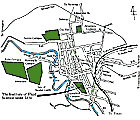|
|
Institute of Fluid Science

History
This Institute was founded in October 1943 as
the Institute of High Speed Mechanics at Tohoku Imperial University. Its mission
was to carry out "Foundamental and Applied Research related to High Speed
Mechanics". For the last half century, it has played a central role in
flow-related research in Japan and has sent many talented people out into the
world. Significant contributions during this period included develoments of a
jet engine (then quite rare anywhere in the world) and energy conversion
equipment and basic research related to medical equipment and transportation
vehicles. The Institute has been responsive to changes in societal needs. In
order to expand its research area to wider fluid science, the Institute was
recognized and renaed in 1989 as the Institute of Fluid Science. Its mission was
to carry out "Foundamental and Applied Research Related to Fluids."
After the recent second recognization, the activities are
focused on high quality investigations on a wide rangeof fluid flow phenomena,
including non-continuum flows, multi-layerd complex flows, behavior of solids,
electromagnetic waves and information flows. Research collaborations are
actively carried out with various research institutes, private industries and
numerous organizations in Japan as well as in many foreign countries, so that
the fruits of the research activities may be introduced to society in
general.

Chronicle
October 5, 1943
The Institute of High Speed Mechanics established in Tohoku Imperial University.
1950
Professor Numachi received the Japan Academy prize for his studies on cavitation-performance of wings.
1975
Professor Ito received the Japan Academy prize for his fluid dynamic studies on internal flows in tubes, especially bend tubes.
April 1, 1979
The laboratory for Air-Flow Measurements established.
April 8, 1988
The laboratory for Air-Flow Measurements closed and the Shock Wave Research Center established.
May 29, 1989
The Institute of Fluid Science started as a result of reorganization.
April 9, 1998
The Institute of Fluid Science re-inaugurated due to reorganization.
The Shock Wave Research Center also re-inaugurated.

Organization
- Administration
- Director
- Faculty Council
- Committees
- Research Division
- Advanced Flow Division
- Reacting Flow Laboratory
- Heat Transfer Control Laboratory
- Cryogenic Flow Laboratory
- Molten Geomaterials Laboratory
- Intelligent Fluid Systems Division
- Electromagnetic Intelligent Fluids Laboratory
- Intelligent Systems Laboratory
- Biofluids Control Laboratory
- Advanced Systems Evaluation Laboratory
- Intelligent Fluids Processing Laboratory (Visiting Professor)
- Non-continuum Flow and Heat Transfer Division
- Gaseous Electronics Laboratory
- Molecular Heat Transfer Laboratory
- Micro-Particulate Flow Laboratory
- Complex Flow Division
- Complex Flow Systems Laboratory
- Computational Fluid Dynamics Laboratory
- Experimental Fluid Dynamics Laboratory
- Theoretical Fluid Dynamics Laboratory
- Visualization Informatics Division(endowed by SGI)
- Visualization Informatics Laboratory
- Attached Facilities
- Wave Research Center
- High Enthalpy Flow Laboratory
- Applied Shock Wave Systems Laboratory
- Short Time Flow Measurement Laboratory
- Foreign Visiting Professors Laboratory
- Advanced Fluid Information Research Center ( Supercomputer Center)
- Common Facilities
- Environmental Fluid Facility
- Library
- Workshop
- Technical Services Division
- Planning and Information Section
- Instrument Development Section
- Measurement Technique Section
- Research Technique Section
- Office of Administration
- General Affairs Section
- Accounts section
- Material Supply Section
To learn more about Institute of Fluid Science visit their home page.
|

